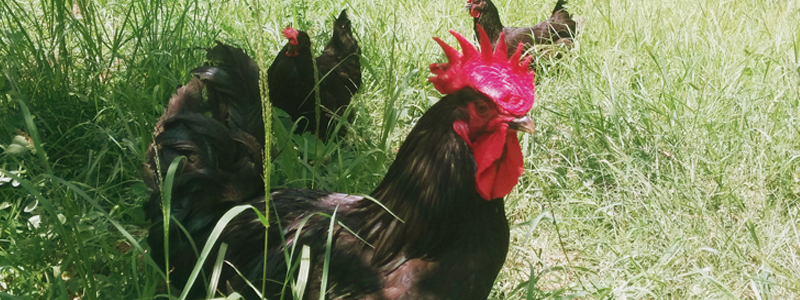Content available at: Español (Spanish)
This particular environment has many benefits:
- Less pollution of water and soil
- Minimal risk of public health problems, thus being very good products for children, the elderly or the immunodepressed, pregnant or lactating women, etc.
- As for the animals, they will have a better level of well-being during their stay on the farm.
On the other hand, it must be borne in mind that in organic poultry, hybrid strains or non-native breeds are being used more often to carry out production, and we must know that these animals are much less resistant to the environmental conditions, which makes them more susceptible to infectious agents.
Despite this, there are indeed farms where indigenous breeds are used, such as “El Sot del Palau”, in Arbúcies (Girona, Spain). In this case they raise broilers with Penedesenca breed birds.
This does not mean that these animals never contract diseases, but it is less likely.
A “negative” aspect of this type of breed would be the conversion, since feed consumption is higher than in hybrids to reach the same weight.
In organic poultry, it is essential to maintain very strict sanitation standards. But above all, special emphasis must be placed on the prevention of potential health problems that may arise on the farm.
There are many aspects to consider in order to make a good disease prevention plan for the organic farm, and not just by looking at the external state of the birds.
- If the farm is located in a very humid place or with high levels of rainfall, the appropriate tasks should be carried out to avoid as much as possible the accumulation of moisture in the land and in the buildings, for example, by constructing drains that lead the water to places out of the reach of the chickens, since these animals have a tendency to drink water from stagnant areas, which could lead to unwanted infections.
- On the other hand, if the farm is located in a place with little rainfall and / or a lot of sunshine, it is very important that the birds have access to shady areas, since it will protect them from the heat and will have thermal damping of the terrain.
We must bear in mind that birds are homeothermic animals, they keep the body temperature of their internal organs constant, but this system stops working optimally when external temperatures fluctuate outside of the “normal” ranges, especially when.
THERMAL STRESS IN ORGANIC POULTRY
Since chickens do not have sweat glands, they raise their wings to increase their surface areas and also open their beaks in order to better evacuate the excess heat by exhaling water vapor.
Another way they can reduce their body temperature is by decreasing their feed intake, since they will consume less caloric energy.
This fact has a very important consequence in production, since it will affect the laying percentage and the quality of the shell in the case of laying hens and in the growth of broilers. For this reason, it must be constantly monitored that birds are not suffering from heat stress.
The maximum population density is a primary factor to avoid this problem, it should never be exceeded. The parameters established by the regulations are those indicated in the attached table.
When choosing the type of house, it must be known that in organic poultry farming it is very common to find parasite problems in birds, so installations made of wood should be avoided as much as possible, since they contain a high number of pores that serve as hiding places for lice, mites, fleas etc.
In addition, all these parasites can be vectors for viruses and bacteria. Once the smallest indication of the presence of parasites has been detected, action must be taken. In organic poultry farming, conventional treatments are not allowed, so you have to look for alternatives, and they are very efficient.
IMPROVING IMMUNITY
In times susceptible to contracting infectious or parasitic diseases, you can help improve the immunity of animals through preventive treatments based on herbal medicine, such as infusions of rosemary, thyme (the latter two thanks to its flavonoid content), aloe (rich in polysaccharides and mucilages) and lavender (eugenol).
These plants can also help when the animals, for whatever environmental reason, suffer some periods of stress, a fact that reduces the immunity of the birds.
Keep up to date with our newsletters
Receive the magazine for free in digital version
REGISTRATION
ACCESS
YOUR ACCOUNT
LOGIN
Lost your password?

